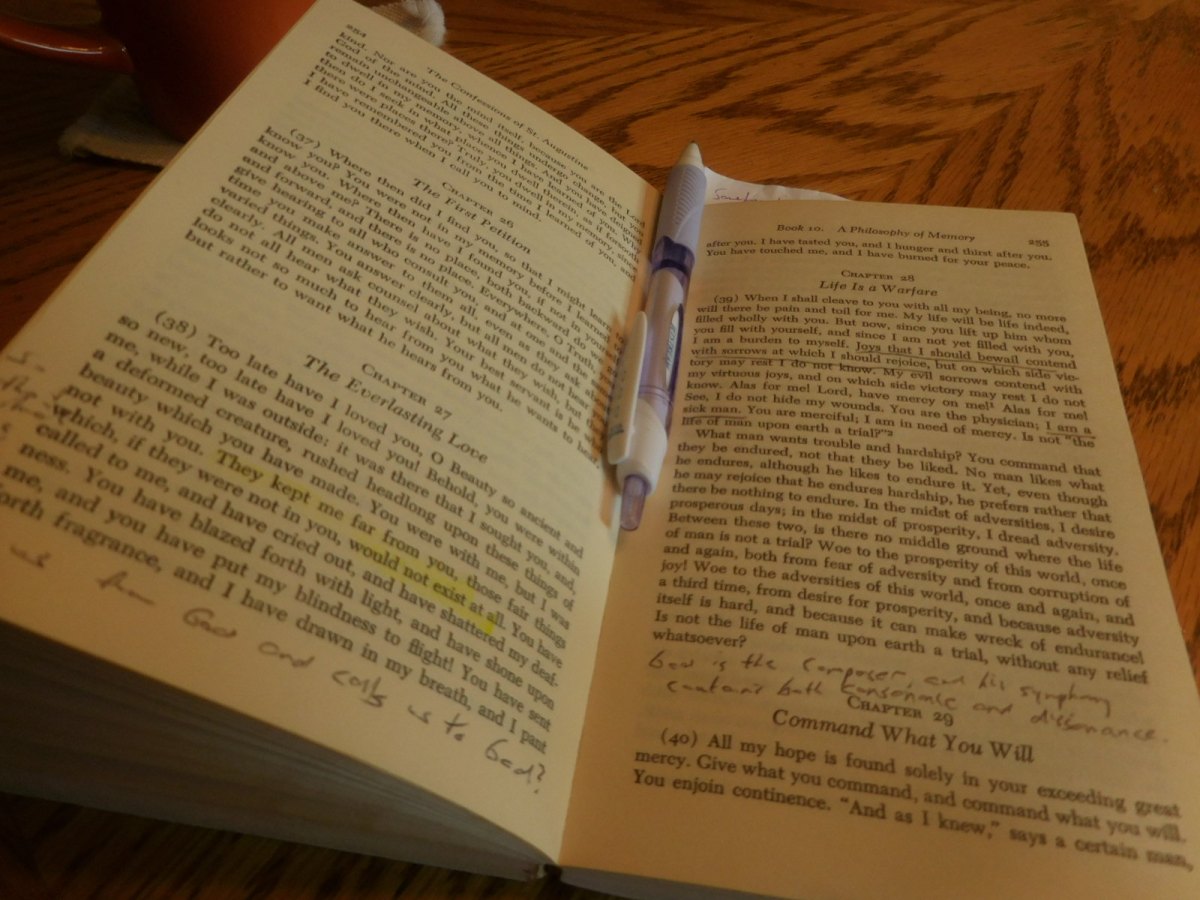The key passage:
To your grace and to your mercy I ascribe it that you have dissolved my sins as if they were ice. To your grace I ascribe also whatsoever evils I have not done…. Who is the man who will reflect on his weakness, and yet dare to credit his chastity and innocence to his own powers, so that he loves you the less, as if he had little need for that mercy by which you forgive sins to those who turn to you. There may be someone who has been called by you, and has heeded your voice, and has shunned those deeds which he now hears me recalling and confessing of myself. Let him not laugh to scorn a sick man who has been healed by that same physician who gave him such aid that he did not fall ill, or rather that he had only a lesser ill. Let him therefore love you just as much, nay even more. For he sees that I have been rescued from such depths of sinful disease by him who, as he also sees, has preserved him from the same maladies.
— Confessions, II/7/15
*****
They kept me far from you, those fair things which, if they were not in you, would not exist at all.
— X/27/38
So that which is of God both keeps us from and calls us to him?
*****
Joys that I should bewail contend with sorrows at which I should rejoice, but on which side victory may rest I do not know…. You are the physician; I am a sick man. You are merciful; I am in need of mercy.
— X/28/39
God is the Composer, and his symphony contains both dissonance and consonance, the former to resolve into the latter?


Thanks for sharing this, Harry! The confessions expose the reader to some very human but, also, deep thinking.
LikeLike
I’m glad you liked it.
I find I can only take it in small doses. I’ll be switching to another book now, but I’ll pick it up again soon.
LikeLiked by 1 person
I can relate to that. It happens all the time with such reading material. It’s mentally challenging.
LikeLike
I’ve also been in an obsessive place concerning reading, recently. Even if I’m enjoying what I’m reading, I can’t stop thinking that I ‘should’ be reading something else. Furthermore, if there is a book I wish to read, I soon get the idea that there is something else I should read first. Oh well, if these are the only problems I have, I guess I’m a lucky man.
LikeLiked by 1 person
As Frank Zappa said, ”So many books, so little time.”
For me, it has to do with the type of book. I usually pick other books in between when I start reading a ”heavy” book and want a few breaks. Otherwise, I normally stick to the book I’m currently reading.
Yes, if only these were our only problems!
LikeLike
(Big smile) I thought I was the only one to quote Frank Zappa! Did he really say that about books, or did you make that up? It doesn’t sound like him. To my pretentious complaint above, I would expect him to say something more like, “Harry, you are an over-educated shithead.” (Thing Fish: Harry & Rhonda)
LikeLiked by 1 person
Misattribution? I don’t know. The quote is attributed to Zappa.
Just a personal question. Can any writer ever be over-educated? I believe that’s an impossibility. No matter how much we read, it’s never enough.
LikeLiked by 1 person
Reblogged this on Lilaia Moreli – Words Are Sacred.
LikeLiked by 1 person
Re: over-education, I think in the context of the Zappa song, Harry was just being an effete pisher. Whether that marks him as over-educated, I can’t say.
LikeLiked by 1 person
Well, this writer has the conviction that humanity suffers from poor education than from over-education.
LikeLike
Ooops, apparently “education” is one of your sacred words! I had no wish to blaspheme, using Mr. Zappa’s lyrics or my own poor representation of them.
LikeLike
No, there was nothing blasphemous in what you said. While it is true that many people hold degrees, speak many languages and are experts on their respective field, I find that they lack character and values. That’s what I meant when I said that humanity suffers rather from poor education. I use the term ”education” in the broader sense, not restricting it to mere knowledge.
LikeLiked by 1 person
“So that which is of God both keeps us from and calls us to him?” –There’s a classical distinction between two ways of approaching God, the *via affirmativa* (‘this is like God’) and the *via negativa* (‘this is not like God’). Any given created thing resembles its creator in some way, yet falls infinitely short — so you can look at it from either direction. I think that’s the way in which created things can both lead us to God and distract us from him.
A lot of the feuds within religious groups, it seems to me, arise from whether the partisans favor the *via affirmativa* or the *via negativa*.
Rick
LikeLiked by 1 person
Dear Rick,
Thank you! I’ll keep pondering on it.
LikeLiked by 1 person